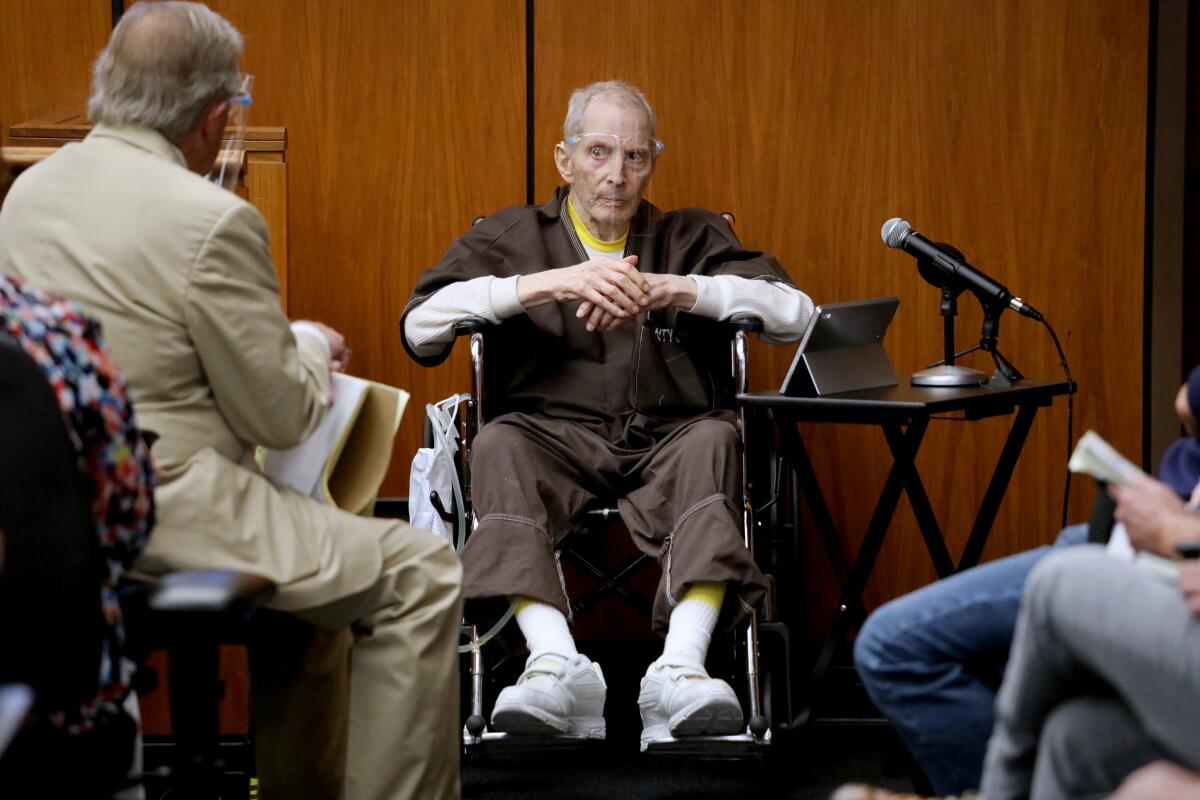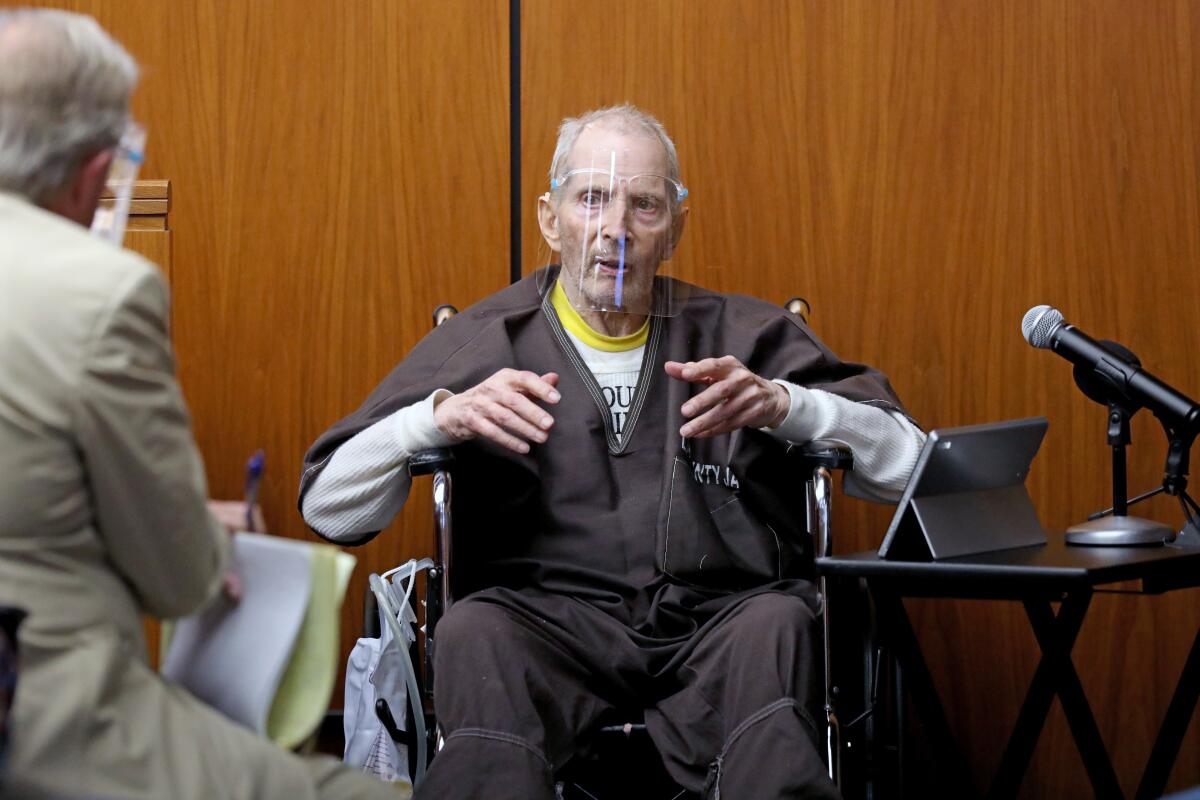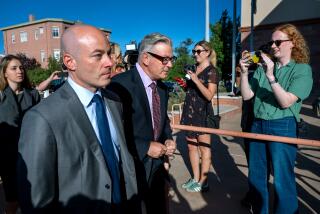Six years after his arrest, Robert Durst takes the stand in L.A. murder trial

Hobbled by old age and cancer, Robert Durst began testifying in his murder trial Monday, completing a bizarre, six-year journey from his arrest in a New Orleans hotel to the witness stand in a Los Angeles courtroom.
Durst, who is charged in the 2000 killing of Susan Berman in her Benedict Canyon home, has sat impassively in a wheelchair for nearly three months as L.A. County prosecutors mounted their case that he shot his close friend in the head to stop her from aiding in an investigation into the 1982 disappearance of his wife.
On Monday afternoon, the real estate scion was rolled to an area next to the witness stand wearing a brown jail jumper and a face shield. Court staff placed a small desk and a microphone next to him. The 78-year-old stretched his arms overhead as he waited for the jury to return to the courtroom. Speaking in a hoarse whisper, Durst gave his name before his lead attorney, Dick DeGuerin, sat at his side.
“Bob, did you kill Susan Berman?” DeGuerin asked.
“No,” Durst replied.
“Do you know who did?”
“No, I do not.”
During his first hour on the stand, Durst went on to recount his childhood, including his mother’s death at the family estate when he was 7 years old and the fact that he blamed his father for her passing.
“I did not see whether she jumped or fell ... I saw her on the roof. I waved at Mommy on the roof,” he said. “Then, I was walked to my bedroom and shortly thereafter, I heard my father yell.”
Durst’s often rambling answers prompted repeated objections from Deputy Dist. Atty. John Lewin, who questioned the relevance of Durst’s childhood to the trial.
Durst also spoke of the first night he met the woman he is accused of murdering. While a student at UCLA in the late 1960s, he rented a room at a fraternity house one summer with two friends and testified he had hopes of “trying to pick up girls.” One day, Stuart Altman, a longtime friend of Durst who testified earlier in the proceedings, brought Berman back to the fraternity house. Durst said he and Berman quickly found a grim point to bond over: the fact that they had both lost parents at a young age.
“Whatever it was, that night, I was relatively talkative ... Susan and I stayed up all night,” he said.

It had been unclear in recent weeks whether Durst would elect to testify — a risky move that will allow prosecutors to grill him under oath after DeGuerin is finished with his questions. DeGuerin said he expects to be done with his questioning by the end of the week, opening the door for Lewin, a prosecutor known for aggressive cross-examinations.
Last month, Durst’s attorneys unsuccessfully sought a mistrial, claiming he is too sick to competently testify in his own defense. Diagnosed with bladder and esophageal cancer, he has relied on a catheter for much of the trial and was briefly hospitalized in June.
Lewin noted in court on Monday that Durst’s illnesses did not seem to be inhibiting his ability to testify, saying the defendant had “complete command” and recall of the decades-old experiences he was relaying to the jury.
Durst’s past willingness to talk about the suspicions and accusations that have hounded him for decades has been, at times, both a liability and an asset for him.
In 2003, Durst took the stand while on trial in Texas charged with murder in the death of Morris Black, a neighbor whose body had been found carved up in Galveston Bay two years earlier. He parried with the prosecutor, claiming he had shot Black in self-defense and then cut up his body while in a traumatized state. Durst, who had fled from New York to Texas in large part to escape media scrutiny following Berman’s killing, was acquitted.
But Durst’s decision to participate in “The Jinx,” an HBO documentary series about the disappearances and homicides that have shadowed his life, reinvigorated national interest in Berman’s case and played a large role in the decision to finally charge him with her murder.
In the closing moments of the show’s final episode Durst can be heard muttering “What the hell did I do? Killed them all, of course,” seemingly unaware he was being recorded. Authorities had reviewed the footage months before it aired and chose to arrest Durst hours before the episode was televised out of concern he might flee.
Many took the recorded utterance as tantamount to a confession, though DeGuerin has dismissed the now-infamous comment as the product of deceptive editing by the filmmakers.
The path from Durst’s arrest to him testifying in his own defense was a legal odyssey that spanned years. When he was first captured in 2015, Durst was allegedly in possession of marijuana and a handgun, leading to charges that had to be resolved in Louisiana. It would be 18 months before he made his first appearance in a Los Angeles courtroom for an arraignment.
From there, prosecutors decided to call a number of crucial witnesses to testify in 2017, archiving their testimony for fear they might die before the case went to trial. After opening arguments finally began in March 2020, the trial was again delayed by the COVID-19 pandemic.
Durst’s defense began presenting its case late Tuesday afternoon. During his opening statement in May, DeGuerin told the jury that prosecutors lack physical evidence tying Durst to the crime scene and urged the panelists to tune out testimony related to Kathleen’s disappearance or Black’s death.
“The only case before you to determine a verdict is the murder of Susan Berman. The evidence is lacking. The evidence isn’t there,” DeGuerin said at the time. “Bob Durst did not kill Susan Berman, and he doesn’t know who did.”
The only other witness expected to take the stand on Durst’s behalf, Dr. Elizabeth Loftus, spent most of Wednesday and Thursday under blistering cross-examination from Lewin. Loftus — a memory expert who has testified or consulted in more than 300 court cases involving high-profile defendants including O.J. Simpson and Harvey Weinstein — has largely explained to jurors how memories can be corrupted over time.
“Our memories are malleable. Which means they’re not fixed. It’s not like a recording device which you can then play back later,” she said Wednesday. “Rather, these memories are subject to contamination, distortion or change.”
Such notions could weigh heavily in a case in which the jury will have to assess the reliability of witnesses’ memories of decades-old conversations with either Durst or Berman.
Lewin spent several hours last Wednesday attacking Loftus for what he said was her bias. He noted she rarely testifies on behalf of prosecutors, referring to her as a “hired gun” for high-profile defendants.
Durst had been expected to take the stand Thursday afternoon, but the proceedings were delayed when court officials learned a person who attended the trial recently had tested positive for COVID-19. The discovery led to an abrupt adjournment for the rest of the week. His testimony will resume Wednesday.
More to Read
Sign up for Essential California
The most important California stories and recommendations in your inbox every morning.
You may occasionally receive promotional content from the Los Angeles Times.











